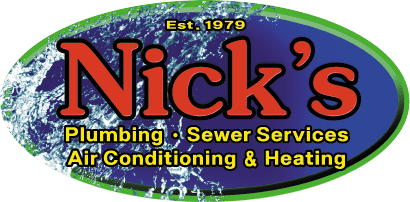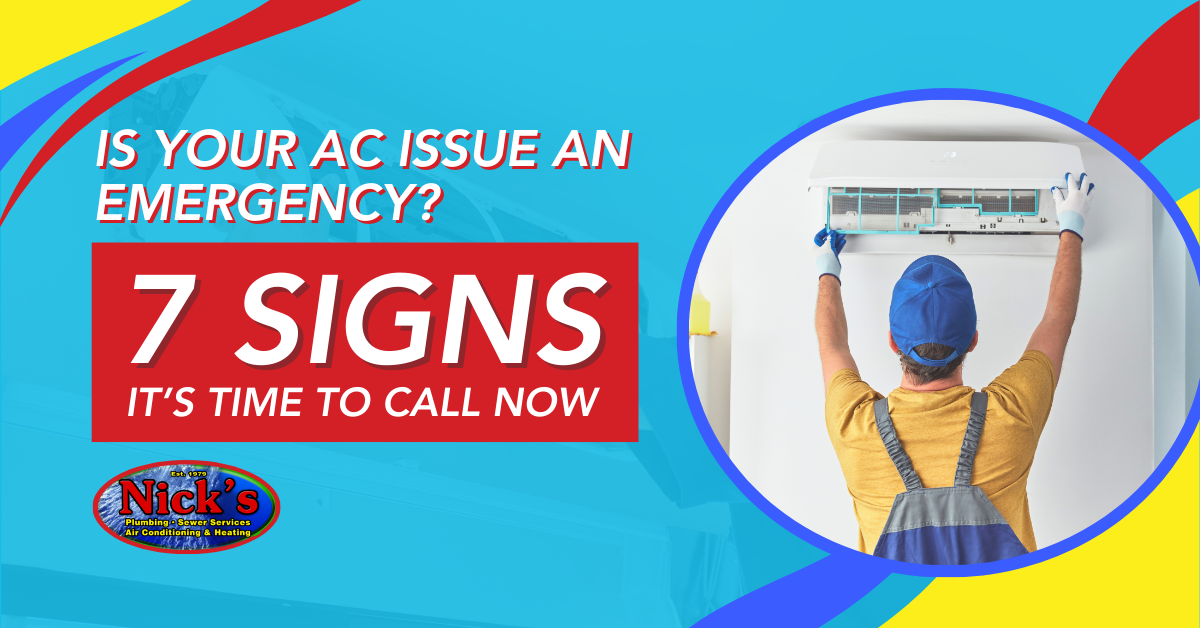Author: Jeff O'Hara
When your air conditioner stops working on another scorching Houston summer afternoon, it can be more than just uncomfortable—it can be dangerous. High indoor temperatures can pose significant health risks, particularly for young children, older adults, and individuals with respiratory conditions and other medical issues.
But how do you know if your AC issue is a true emergency or something that can wait for a regular service call?
In this blog, we’ll help you identify the signs of an actual HVAC emergency. Understanding these can help you make more informed decisions, ensuring your comfort and safety while potentially saving you from expensive emergency charges or costlier repair bills that are incurred when work needs to be performed outside of regular business hours.
So, Is Your HVAC Issue an Emergency or Just an Inconvenience?
Some homeowners will question whether their AC problem is a true emergency, even as they’re sitting in their living room in a shirt drenched in sweat and it’s 105° outside. Others identify an HVAC emergency as anytime their air conditioning blows slightly cooler air than usual, or is making a “funny, buzzing sound sometimes.”
I’ll let you decide which of the above HVAC problems is the actual emergency, but should you find yourself facing a true HVAC emergency like our friend in the wet shirt, you need to get on the phone with Nick’s Air Conditioning as soon as possible.
And yes, I lied about letting you decide the fate of our imaginary customers. That’s because while some AC-related problems are certainly inconvenient, like your AC blowing only “cool” air instead of “cold” air, they mainly occur during an extreme heat wave. However, it’s a problem that can be safely addressed during regular business hours tomorrow. Others, like a total loss of cooling during extreme heat, will require immediate attention.
Nick’s AC’s Emergency Rule of Thumb
If the issue poses a risk to your safety, health, or the integrity of your home, it’s an emergency. Otherwise, if you can stay comfortable and safe and no immediate damage is occurring, it’s probably in your best interest to schedule service during regular business hours.
What Qualifies as an AC Emergency?
Complete System Failure During Extreme Temperatures
If your air conditioner suddenly shuts down in the middle of a heatwave (or a rare Houston cold snap), it’s more than just uncomfortable—it can be dangerous. Indoor temps can rise quickly, creating serious health risks for young children, elderly family members, and anyone with respiratory or cardiovascular conditions. In these situations, it’s essential to call for emergency service right away to get the system back up and running before things get worse.
Burning Smells or Electrical Odors
Smelling something burning when your HVAC system kicks on? Shut it down immediately. A burning smell or the scent of hot plastic or wires can indicate a serious electrical issue, such as overheating components or faulty wiring. These are not issues to troubleshoot on your own—they could lead to electrical fires if ignored. Call a professional right away and don’t turn the system back on until it’s been looked at.
AC Not Cooling and Making Loud Noises
If your system is running but you’re not getting any cool air—and it’s also making strange grinding, squealing, or banging sounds—you’re likely dealing with a mechanical failure. These noises often mean a broken fan motor, a failing compressor, or loose internal parts. Continue running the system, and you risk causing further damage, resulting in more expensive repairs. Shut it down and schedule service as soon as possible.
Refrigerant Leaks
Refrigerant is vital to your AC’s cooling process, but it’s also a chemical that can be harmful to people and the environment. If you notice ice on your refrigerant lines, hissing sounds near the outdoor unit, or your system is blowing warm air, a leak could be to blame. This isn’t something you can fix with a DIY kit—refrigerant handling requires EPA-certified technicians. Left unaddressed, leaks can ruin your compressor and turn a minor maintenance issue into a major system replacement.
No Airflow from Vents
When your AC is running but there’s little or no air coming through the vents, you might be dealing with a severe airflow restriction or component failure. It could be anything from a collapsed duct to a failed blower motor or a completely clogged filter. Whatever the cause, your system is straining without actually cooling your home, and that can lead to more significant breakdowns quickly.
Frozen Evaporator Coils
Ice buildup on your air conditioner’s evaporator coils is a clear sign of trouble. This freezing typically results from inadequate airflow, often due to clogged air filters, blocked vents, or malfunctioning fans, which prevents warm air from circulating over the coils. Without sufficient airflow, the coils become too cold, causing moisture in the air to freeze upon contact. Another common cause is low refrigerant levels; insufficient refrigerant can lower the pressure within the coils, leading to temperatures that cause freezing. Operating your AC with frozen coils can strain the compressor and potentially lead to system failure. If you observe ice buildup, it’s advisable to turn off the system and consult a professional technician to diagnose and address the underlying issue.
Summary
Not every AC hiccup escalates into a full-blown emergency, but some symptoms should not be overlooked. If you’re experiencing extreme temperatures, unusual smells, loud noises, leaks, or a complete lack of airflow, it’s time to make the call. Swift action by the homeowner can prevent further damage, safeguard your health, and return your home to a comfortable state when the weather demands it most.
What Should You Do If You Suspect an AC Emergency?
Suppose you’re facing an HVAC emergency. In that case, the first step is safety. Turn off your HVAC system at both the thermostat and the circuit breaker panel to prevent further damage and reduce the risk of electrical hazards.
While you’re waiting for your AC technician, you can try to keep your home comfortable by closing curtains on the east and west sides of the house and opening windows at the north and south sides. This prevents direct sunlight from entering the home, and also allows slightly cooler air to be drawn indoors. Use as many window fans, ceiling fans, and industrial warehouse fans as you can buy, borrow, or both; do whatever it takes to keep air circulating throughout the entire house.
As always, if there is any doubt as to whether your HVAC issue is indeed an emergency, feel free to call Nick’s Air Conditioning and request a visit from one of our licensed, experienced HVAC technicians. They’ll be able to confirm if the problem is benign or more serious, and they are there to help guide your next steps.
Keys to Preventing AC Emergencies in the Future
What’s the best way to avoid middle-of-the-night AC emergencies? Stay proactive. Keeping up with a regular maintenance schedule can help identify minor issues before they develop into significant problems, prolong the lifespan of your HVAC system, and allow it to operate more efficiently while enhancing its performance.
Change Air Filters Regularly
Neglecting to replace your HVAC system’s air filter can lead to a host of problems. A clogged filter restricts airflow, forcing your system to work harder to maintain the desired temperature. This increased strain not only reduces efficiency but can also cause components, such as the blower motor, to overheat, potentially leading to system failure. Moreover, restricted airflow can result in frozen evaporator coils, further impairing your system’s performance. Regularly changing your air filter—ideally every 1 to 3 months—can prevent these issues, ensuring optimal airflow, reducing energy consumption, and prolonging the lifespan of your HVAC system.
Schedule Seasonal Tune-Ups
Regular HVAC maintenance in Houston is crucial for ensuring your system operates efficiently and reliably throughout the year. Neglecting routine upkeep can lead to decreased performance, higher energy bills, and unexpected breakdowns. By scheduling regular inspections and tune-ups, you can identify and address minor issues before they escalate into costly repairs. This proactive approach not only extends the lifespan of your HVAC system but also maintains optimal indoor air quality and comfort levels.
Address Small Problems Early
Addressing minor HVAC issues promptly, such as unusual noises, reduced airflow, or minor leaks, can prevent them from escalating into major, costly repairs. These seemingly insignificant problems often indicate underlying issues that, if left unattended, can strain your system, decrease efficiency, and lead to unexpected breakdowns. Regular maintenance and early intervention not only safeguard your comfort but also protect your investment by ensuring your HVAC system operates at peak performance.
When It’s Time For Reliable HVAC Service, It’s Time to Call Nick’s!
When your AC falters—be it a complete shutdown during a heatwave, strange odors, or unsettling noises—it’s crucial to act swiftly. Delaying repairs can escalate minor issues into major problems. Nick’s Air Conditioning has been a trusted name in Houston since 1979, providing prompt and professional service to restore your comfort and peace of mind.
Whether it’s an HVAC emergency or a routine check-up, our experienced technicians are standing by, ready to assist. Call Nick’s today to schedule your service and experience the reliability that has earned Nick’s over 3,500 five-star Google reviews and countless happy customers!
Relax, We’re on the Way.


